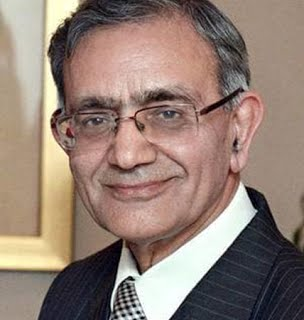Many years back I was invited by the then Vice Chancellor of JNU ( Jawaharlal Nehru University ), Delhi for dinner along with about a dozen Professors of the University

I was told that the budget of the University Grants Commission was Rs.41,000 crore in the Five Year plan, and the annual budget of JNU alone was about Rs.200 crores.
In my usual blunt way I said, “How has this benefited the Indian masses? It seems that the huge funds being ploughed into higher education in India are for the benefit of foreign countries and to give you Professors huge salaries and fine houses to live in rather than to benefit the Indian people.”
This sparked off a lively debate. Some of the professors tried to refute my statement, but I stuck to my guns.
I said that most of the money spent on education in India went to the institutes of higher education like the IITs and universities, and very little money was spent on primary and middle schools, particularly in rural areas, where the foundation of education was laid. There are very few facilities such as proper teachers, proper classrooms, proper seats, electricity, libraries, etc in these primary or middle schools, whereas the institutes of higher education are given huge funds and have very good facilities, state-of-the-art campuses, air-conditioning, etc.
I then gave a few examples to prove what I said:
1. I once went to a village about 40 km from Allahabad (my native city) to meet a farmer friend of mine, with whom I had studied at Allahabad University.
At his home I met one of his sons who had passed class seven and promoted to class eight in his high school in the village. I asked him to bring his class 7 mathematics book and solve a few simple problems. He could not do so. I wondered how he had been promoted to class 8 when he could not solve simple class 7 problems. I then solved those simple problems, and asked him to attempt the other problems in the lesson. He was obviously an intelligent boy, because having learnt how to solve the simple problems, he proceeded to solve the rest.
At this I asked him, “Did your teacher not teach you all this?” He replied, “Master Sahib thekedari karne lage hain, aur doosre master sahib class lene aate naheen hai” (the earlier teacher has become a contractor, and the next teacher does not come to take classes”).
2. I went to a reputed intermediate college in Allahabad and was told that in a section in Class 11 there are 250 students. I was shocked. Under the rules there should not be more than 40 students in a class. What teaching can possibly be done in a class of 250 students? I also learnt that in some of the sections at Allahabad University there are over 300 students, and there is not even place for a student to sit.
In view of this, much of the real education takes place in private coaching institutes, or at the residence of teachers who make much more money there than in their institutions. As a result, these teachers evince little interest in teaching in their institutions, and a student who does not join the coaching (paying high fees) finds it difficult to pass.
3. In many of the staffrooms of our educational institutions, teachers, instead of discussing academic matters, often discuss petty politics, often of a casteist nature or matters pertaining to their service conditions. Senior professors often get appointed or promoted people of their own caste, whether they have merit or not.
4. Teachers are often appointed not on merit but on extraneous considerations, like political connection, caste, etc. They are appointed on contract basis. In some States, “shikshamitra” who have been appointed on a salary of Rs.1,500 a month have no degree or teachers’ training qualification.
5. The level of intellect of many teachers is low, ( like the teachers in Dickens’ novels ) because many of them have not been appointed on merit but on extraneous considerations.
To give an example, when I was a judge of Allahabad High Court I had a case relating to a service matter of a mathematics lecturer in a university in Uttar Pradesh. Since the teacher was present in court I asked him how much one divided by zero is equal to. He replied, “Infinity.” I told him that his answer was incorrect, and it was evident that he was not even fit to be a teacher in an intermediate college. I wondered how had he become a university lecturer.
In mathematics it is impermissible to divide by zero. Hence anything divided by zero is known as an indeterminate number, not infinity. To explain, suppose 1/0=x. Then x multiplied by 0 should be 1. But we know that anything multiplied by 0 becomes 0. Hence it is impermissible to divide by 0.
Infinity is not a number at all. It simply means that there is no end to numbers as they are increased. It can be accurately expressed as follows :
Limit of 1/x, x tending to 0, is infinity.
I gave them many more such examples, and told the senior academicians at JNU that huge amounts of money of the Indian taxpayer is spent on the IITs and other institutes of higher education, but the graduates of these institutes often take up jobs in foreign countries. This results in brain drain. Thus, while Indians pay taxes which go towards educating our bright students, the benefit of their education goes to foreign countries and not to the Indian people. These foreign countries benefit because higher education in their own countries is very expensive, so they have to pay only a fraction of that amount to get our bright young students.
I posed them another question: the test of every system is one simple question. Does it raise the standard of living of the masses or not? I said that the huge amount of money being spent on higher education in India is not raising the standard of living of the Indian masses because about 75 per cent of Indians continue to live in dire poverty. Also, there is massive unemployment, malnutrition, skyrocketing prices, huge problems of health care, housing, etc.
Apart from that, I asked them how many Nobel laureates have our universities and other institutes of higher education produced ? Hardly any.
In many American universities one will find half a dozen Nobel laureates in their faculties.
Australia, which has a population of about 25 million, has 180 academicians who have an F.R.S. (Fellow of the Royal Society), while India, with a population of 1,200 million, has only about 20. So what are the achievements of our scientists and other intellectuals? It is only when they go to the United States or Canada or Europe that they achieve anything.
What is the quality of research work done by our academicians in institutes of higher learning? Unfortunately it is abysmally low and does not benefit the Indian people. Their publications ( often plagiarism ), are mostly poor, and done only to improve their CVs in order to get jobs.
The purpose of education is to help raise the standard of living of the masses. But in India it seems that its purpose is to raise the standard of living of a handful of people who get jobs as govt servants, corporate employees, teachers, etc
I must say to the credit of the professors assembled there that they did not take any of my remarks personally. I told them that I had no intention to insult them but was only voicing my genuine grievance about the defects in the educational system in India, and the need to make it beneficial to the masses.
At the end it was agreed that my views required serious debate










Very good article! Raises the point of BHU. Hows does India benefit from that eminent University?
Thank you for posting this.